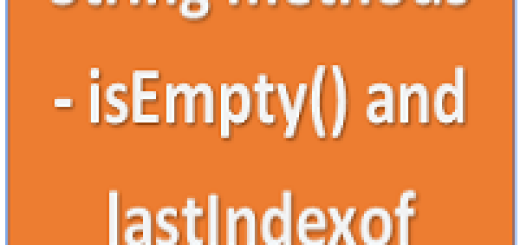String methods – charAt() and compareTo()
I this post, we will discuss about string methods charAt() and compareTo().
Let’s discuss them one by one with examples.
charAt():
The method charAt(int index) returns the character at the specified index. Index should be between 0 and string length-1.
public class ExampSubstring {
public static void main(String[] args) {
String val1 = "Hello World";
System.out.println("Returns the character - "+val1.charAt(6)); // returns W
}
}
compareTo():
The method compareTo() is used for comparing two strings lexicographically. Each character of both the strings is converted into a Unicode value for comparison.
If both the strings are equal then this method returns number 0 else it will return positive or negative value.The result is positive if the first string is lexicographically greater than the second string else the result would be negative.
public class ExampCompareTo {
public static void main(String[] args) {
String val1 = "Hello World";
String val2 = "Hello World";
String val3 = "How are you?";
String val4 = "How are you doing?";
System.out.println("Compare val1 and val2 : "+val1.compareTo(val2));
System.out.println("Compare val2 and val3 : "+val2.compareTo(val3));
System.out.println("Compare val3 and val4 : "+val3.compareTo(val4));
}
}
Compare val1 and val2 : 0
Compare val2 and val3 : -10
Compare val3 and val4 : 31
String compareToIgnoreCase():
It is similar to the method compareTo(). The only difference is it ignores the case like uppercase and lower case while comparing i.e. it is not case sensitive.
public class ExampCompareTo {
public static void main(String[] args) {
String val1 = "Hello World"; //String in lowercase
String val2 = "HELLO WORLD"; //String in uppercase
String val3 = "How are you?";
String val4 = "How are you doing?";
System.out.println("Compare val1 and val2 : "+val1.compareToIgnoreCase(val2));
System.out.println("Compare val2 and val3 : "+val2.compareToIgnoreCase(val3));
System.out.println("Compare val3 and val4 : "+val3.compareToIgnoreCase(val4));
}
}
Compare val2 and val3 : -10
Compare val3 and val4 : 31



1 Response
[…] char charAt(int index) […]